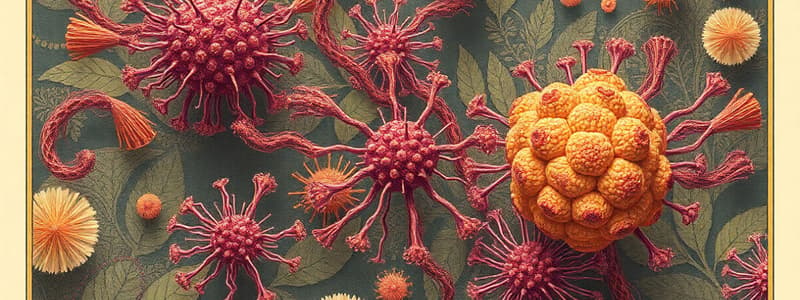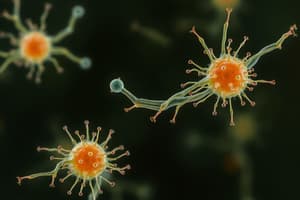Podcast
Questions and Answers
What distinguishes prokaryotes from eukaryotes in terms of cellular structure?
What distinguishes prokaryotes from eukaryotes in terms of cellular structure?
- Prokaryotes do not have a nucleus or organelles. (correct)
- Eukaryotes are unicellular organisms only.
- Prokaryotes have a nucleus and organelles.
- Eukaryotes have simpler cellular properties.
Which of the following statements about viruses is accurate?
Which of the following statements about viruses is accurate?
- Viruses possess organelles and a nucleus.
- Viruses are neither prokaryotes nor eukaryotes. (correct)
- Viruses are complex organisms with cellular properties.
- Viruses are classified as prokaryotes.
Which scientist is credited with the postulation of the germ theory of disease?
Which scientist is credited with the postulation of the germ theory of disease?
- Robert Hooke
- Anton van Leeuwenhoek
- Robert Koch
- Louis Pasteur (correct)
What impact did antibiotics have on microbial infections after World War II?
What impact did antibiotics have on microbial infections after World War II?
Which of the following best characterizes Robert Koch's contributions to microbiology?
Which of the following best characterizes Robert Koch's contributions to microbiology?
In which period were many agents of infectious diseases identified?
In which period were many agents of infectious diseases identified?
What advancement allowed for the rapid development of knowledge about viruses in the 1940s?
What advancement allowed for the rapid development of knowledge about viruses in the 1940s?
What role did vaccines play in the control of viral diseases in the 1950s and 1960s?
What role did vaccines play in the control of viral diseases in the 1950s and 1960s?
Which of these organisms belongs to the eukaryotic domain?
Which of these organisms belongs to the eukaryotic domain?
What type of organisms are included in the Animalia classification?
What type of organisms are included in the Animalia classification?
Flashcards
Prokaryotes
Prokaryotes
Organisms with simple cells lacking a nucleus and organelles, like bacteria.
Eukaryotes
Eukaryotes
Organisms with complex cells containing a nucleus and other membrane-bound organelles, like fungi, protozoa, and algae.
Viruses
Viruses
Non-living entities composed of genetic material (DNA or RNA) surrounded by a protein coat, requiring a host cell to reproduce.
Germ Theory of Disease
Germ Theory of Disease
Signup and view all the flashcards
Cultivation (Microbiology)
Cultivation (Microbiology)
Signup and view all the flashcards
Etiologic Agent
Etiologic Agent
Signup and view all the flashcards
Antibiotics
Antibiotics
Signup and view all the flashcards
Electron Microscope
Electron Microscope
Signup and view all the flashcards
Vaccines
Vaccines
Signup and view all the flashcards
Golden Age of Microbiology
Golden Age of Microbiology
Signup and view all the flashcards
Study Notes
Microbial Organisms
- Microorganisms are grouped into prokaryotes and eukaryotes.
- Prokaryotes lack a nucleus and organelles (e.g., bacteria).
- Eukaryotes have a nucleus and organelles (e.g., fungi, protozoa, unicellular algae).
- Viruses are neither prokaryotic nor eukaryotic.
Development of Microbiology
- Early Beginnings:
- Robert Hooke observed fungi.
- Anton van Leeuwenhoek observed microscopic organisms (animalcules).
- He provided descriptions of protozoa, fungi, and bacteria.
- Germ Theory of Disease:
- Louis Pasteur proposed microorganisms cause infectious diseases.
- Robert Koch's Proof:
- Isolated anthrax bacteria.
- Showed pure cultures caused anthrax in mice.
- Golden Age of Microbiology:
- Many infectious disease agents identified.
- Led to stopping epidemics by controlling microbial spread.
- Post-WWII Advancements:
- Antibiotics became primary therapy for microbial infections.
- This led to fewer cases of pneumonia, tuberculosis, meningitis, syphilis, etc.
- Viral Research Advancements:
- Electron microscopes allowed for viral observation.
- Led to rapid knowledge advancement.
- Vaccines developed in the 1950s-60s controlled diseases like polio, measles, mumps, and rubella.
Studying That Suits You
Use AI to generate personalized quizzes and flashcards to suit your learning preferences.




